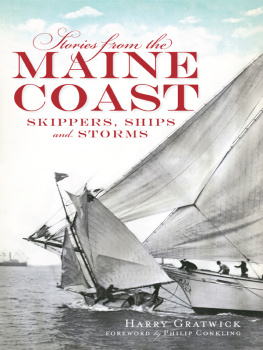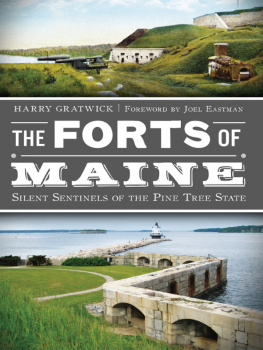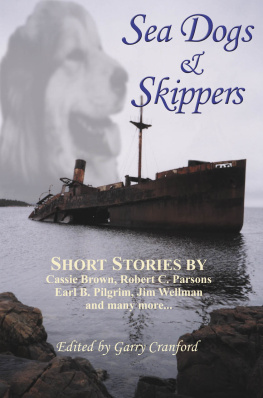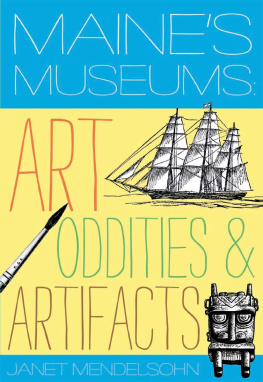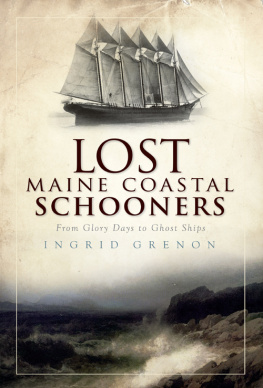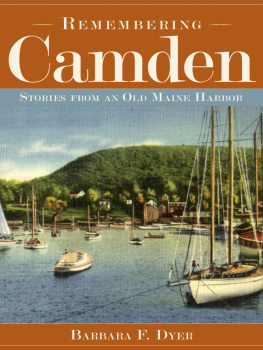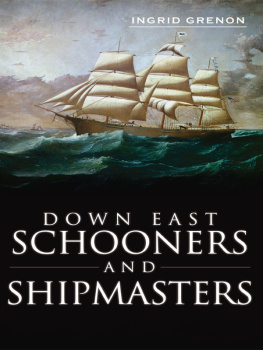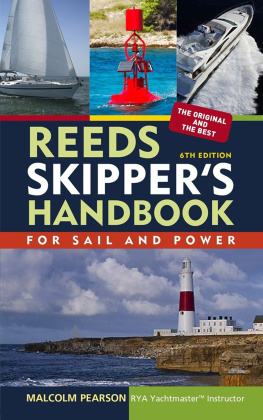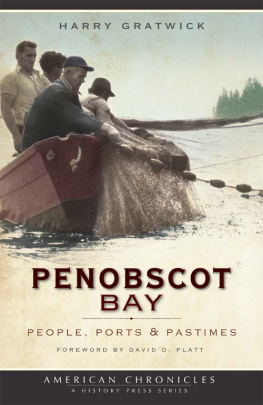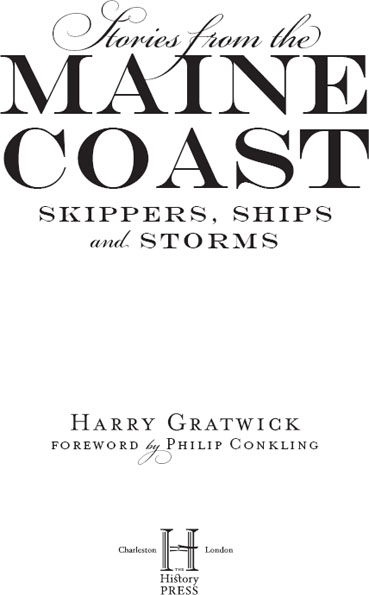
Published by The History Press
Charleston, SC 29403
www.historypress.net
Copyright 2012 by Harry Gratwick
All rights reserved
Cover image: Collision between Little Annie and Virginia, 1903. Anonymous.
First published 2012
Manufactured in the United States
ISBN 978.1.62584.076.9
Library of Congress Cataloging-in-Publication Data
Gratwick, Harry.
Stories from the Maine coast : skippers, ships and storms / Harry Gratwick.
p. cm.
Includes bibliographical references.
print edition ISBN 978-1-60949-249-6
1. Atlantic Coast (Me.)--History. 2. Seafaring life--Maine--History. 3. Ships--Maine--History. 4. Shipbuilding--Maine. 5. Ship captains--Maine--Biography. I. Title.
F27.A75G727 2012
974.1--dc23
2011047612
Notice: The information in this book is true and complete to the best of our knowledge. It is offered without guarantee on the part of the author or The History Press. The author and The History Press disclaim all liability in connection with the use of this book.
All rights reserved. No part of this book may be reproduced or transmitted in any form whatsoever without prior written permission from the publisher except in the case of brief quotations embodied in critical articles and reviews.
This book is dedicated to Francis MacMcAdoo,
friend and skipper extraordinaire.
CONTENTS
FOREWORD
Geologists call the Maine coastline a drowned coast, not because so many of its mariners have drowned here (as my young son once supposed), but because after the last glacier melted, the sea flooded what was once a rolling coastal lowland to create a deeply incised coastline and a long chain of isolated islands. This geological history also bequeathed us a bountiful legacy of coves, harbors, guts and guzzles from which mariners have launched uncountable thousands of vessels, underscoring Maines maritime heritage since earliest times.
Maines intricate island and coastal topography, and the deep-water channels connecting them, offeredalmost beggedits settlers to become seafarers. For three hundred years, the first (and only) highways that connected the Maine coast and archipelago to the routes of international commerce were maritime sailing routes that originated in isolated places like Carvers Harbor on Vinalhaven and the Deer Isle Thorofare that streamed by the salty, spruce-lined coves of Stonington.
Island settlement was also spurred by the legendary concentrations of spawning cod and haddock that congregated around the shores of Maines islands in such vast numbers that places like the Isles of Shoals and Haddock Ledge in Penobscot Bay were named for the bounty created by their annual migrations and made fishermen out of settlers who originally came here to farm.
The mariners stories that Harry Gratwick has assembled in this book include accounts of some of the great triumphs, as well as the tragedies, that maritime life leaves in the bones of those who follow the sea. Since I happened to have married into a family that occupied a magnificent four-story house built in 1857 by the seafarer and successful fish merchant Timothy Lane and his wife, Rebecca, for their nine children on a hilltop overlooking the busy commercial Carvers Harbor on Vinalhaven Island, I have a particular admiration for this collection of great Maine sea stories. Few of our family members, nor our innumerable visitors during the past forty years who have spent a night in Timothy and Rebecca Lanes solidly built ten-bedroom house, have failed to sense in the creaks of this wonderful structure the spirit of one of Maines great marine innovators who, with generations of other nautical families along Maines long and lonely coast, has left us with such a rich maritime legacy. Thankfully, this volume nicely captures Maines maritime spirit.
Philip Conkling
Founder and President
Island Institute in Rockland, Maine
ACKNOWLEDGEMENTS
A number of people have been invaluable in helping me with information and advice on writing this book. I am indebted to Mac and Cynthia McAdoo for their PT boat memories, as well as their friendship; to Emily Lane and Dick and Lee Morehouse for their stories about the Lane family and Lanes Island; and to Peter and Lucy Bell Sellers, from whom I learned about boat building persistence. And thank you to John Washburn for his friendship and memories of Hurricane Edna.
Special thanks to Joey Zehr and Frank Garber for their technological wizardry, to Mark Warner for his materials on the Royal Tar and to George Buzby for being a friend and an old salt.
The Rhodes 19 story would not have been possible without assistance from Dave Whittier, Peter Plumb, Stuart Scharaga, Jim Taylor, Fred Brehob, David Pyles and my brother, Joel Gratwick.
I am grateful to Cipperly Good and Donald Garrold at the Penobscot Marine Museum, to Nathan Lipfert at the Maine Maritime Museum, to Erik Fleischer at the John Fitch Steamboat Museum, to Bill Haviland at the Deer IsleStonington Historical Society, to Eric Jergensen and Janice Zenter at the Maine Maritime Academy, to Philip Conkling and Gillian Thompson at the Island Institute and to Richard Lindermann at the Bowdoin College Library Special Collections.
Kudos to Sue Radley, Bill Chilles, Roy Heisler and Loretta Chilles at the Vinalhaven Historical Society, as well as Valerie Morton and Linda Whittington at Vinalhaven Public Library, for their generous help and support.
Finally, the encouragement and enthusiasm of my son, Stephen, and the love and editorial skill of my wife, Tita, are deeply appreciated.
I
SKIPPERS
THE LANE FAMILY: A TRADITION OF SEAFARERS
The roots of the Lane family reach well back into history. According to James Fitts, author of the Lane Genealogies, a member of the Lane family fought with Oliver Cromwell in the English Civil War, and a Lane came over on the Mayflower. Later Lanes fought in the French and Indian War, as well as in the Revolutionary War battles of Lexington and Concord and Bunker Hill.
In less conflicted times, Mr. Fitts informs us that Lanes distinguished themselves as physicians, lawyers, inventors, politicians, teachers, ministers, missionaries, businessmen and writers. However, by far the greatest number of the North American Lane family have made their living from the sea; many were fishermen, shipbuilders, shipowners and ships masters. In his Genealogies, Fitts lists fourteen sea captains and another five who were shipowners.
Some Prominent Ancestors
LEVI LANE (17541806) was born near Gloucester, Massachusetts, and began his career as an apprentice sailmaker. At the Battle of Bunker Hill, he saw action as a member of Captain Nathaniel Warners company. Levi then went to France and returned on the same ship as the Marquis de Lafayette in 1777. After the war, Mr. Lane became a sail maker of wide repute. His [sails] were the best to come out of Boston. Lane went on to become a leading merchant and shipowner, although, Fitts writes, he lost some vessels to French spoliation [plundering] about 1800. He was a pew owner and prominent member of the First Universalist Church in Boston.
CAPTAIN FRANCIS LANE (17561829) was a minuteman (colonial militia) from Gloucester who fought at the Battle of Bunker Hill. For the remainder of the war, Lane served on board a privateer, for which he received a share of prize money. After the war, he studied navigation and was subsequently appointed master of a ship that made numerous voyages to the West Indies. When his ship was wrecked, he managed to recover the cargo (of cotton). He then returned to New England, where he coasted [traded] between Boston and Portland for many years.
Next page
